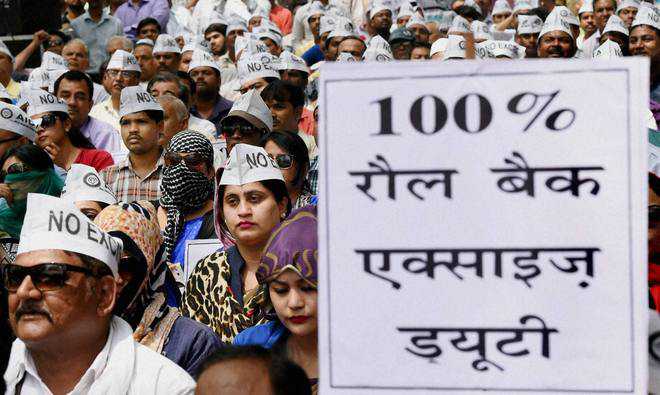Chandigarh, As the standoff between the government and jewellers continues, jewellers across the country have lost around Rs 40,000 crore owing to the ongoing strike against the imposition of one per cent excise duty on gold and diamond jewellery in the Budget.
The strike entered its 40th day today, despite the Centre’s assurance of constituting a committee to look into the procedural issues of excise implementation on jewellers. The imposition of excise duty is a step taken by the government to check circulation of black money, since gold competes with real estate in attracting black money.
The Confederation of All India Traders (CAIT), which is supporting jewellers’ strike, has called for a comprehensive study of all sources of black money and has urged the government to draw a conclusive strategy to check its flow in the country. They are of the view that singularly blaming the trading community, particularly jewellers, amounts to gross injustice.
It’s not for the first time that the excise duty has been levied on the trade. In 2012, then Finance Minister Pranab Mukherjee had imposed it too but rolled it back after a jewellers’ strike that lasted around 20 days.
More than 700 jewellery trade associations are participating in the strike. Over 1.5 crore jewellers and 2.75 crore artisans are in the jewellery trade across the country and generate an annual turnover of Rs3 lakh crore. Further, India imports 1,000 metric tonnes of gold annually. Punjab, Haryana, Himachal and Jammu and Kashmir constitute 12 per cent of the total business.
The stand-off
Jewellers say they are not against the tax but likely frequent harassment by excise officials through raids and calling for irrelevant papers. They maintain that smaller players will not be able to maintain their accounts books.
Senior officials in the excise department say since jewellers adhere to the VAT compliance by the state governments, they are proficient in keeping records. So, this is not the apt reason for the protest. They further add that since excise duty is an indirect form of tax, they don’t have to absorb it unlike other excisable products.
Steps taken & resistance
The government has announced to set up a committee to interact with the trade and allied industry on tax laws, which will submit its report in 60 days.
Praveen Khandelwal, secretary general of the Confederation of All India Traders (CAIT), says the committee is yet to start its work. “We want that the committee should start work soon without any bias and with equal representation from the industry,” he told The Tribune.
The government has assured jewellers that no raids or inspection will be conducted at their premises. Further, the government has said all payments of central excise duty will be based on the invoice value and the excise authorities concerned will not challenge the valuation given in the invoices provided the purity and weight of the gold or precious stones mentioned on the invoice. Dissatisfied with the government assurances, jewellers have refused to end their strike.
The CAIT has also challenged legitimacy of imposition of excise duty on gold. Khandelwal, who recently released the White Paper, said: “Unlike other businesses where expenditure is done for consumption, in jewellery trade the payment is done for investment. This is the precise reason that when we sell jewellery, the profit or surplus earned on its sale is taxed as capital gains and not as income from other sources or business income as individual under income tax laws, which is also a Central enacted law.”
He said: “Taxing jewellery is nothing but taxing investments and under the Excise Act, the government has no power to levy excise on investments. There are many products for investment in the country but excise has not been levied on any of them.”
Breaking News
 Number of Indian Americans in elected offices not reflective of their population: Kamala Harris
Number of Indian Americans in elected offices not reflective of their population: Kamala Harris Strained Indo-Canadian ties dampen Punjabi NRIs’ interest in poll
Strained Indo-Canadian ties dampen Punjabi NRIs’ interest in poll Arthur Irving, one of Canada’s richest people, dies at 93
Arthur Irving, one of Canada’s richest people, dies at 93 PUNJAB POLICE ARRESTS THREE OPERATIVES OF SFJ FOR WRITING PRO-KHALISTAN SLOGANS
PUNJAB POLICE ARRESTS THREE OPERATIVES OF SFJ FOR WRITING PRO-KHALISTAN SLOGANS Indian-origin woman stabbed to death at bus stop in London
Indian-origin woman stabbed to death at bus stop in London Former Indian Army officer working with UN killed in Gaza
Former Indian Army officer working with UN killed in Gaza Situation remains tense in Pakistan-occupied Kashmir as strike enters 4th day
Situation remains tense in Pakistan-occupied Kashmir as strike enters 4th day 8 dead, over 60 injured as huge billboard collapses in Mumbai amid rain
8 dead, over 60 injured as huge billboard collapses in Mumbai amid rain Bhagwant Mann shoulders the bier of revered Punjabi poet Dr Surjit Patar
Bhagwant Mann shoulders the bier of revered Punjabi poet Dr Surjit Patar 209 NOMINATIONS FILED ON FIFTH DAY IN PUNJAB
209 NOMINATIONS FILED ON FIFTH DAY IN PUNJAB Chennai Super Kings beat Rajasthan Royals by 5 wickets in IPL thriller
Chennai Super Kings beat Rajasthan Royals by 5 wickets in IPL thriller Police recover Rs 84 lakh, luxury vehicles from 13 members arrested
Police recover Rs 84 lakh, luxury vehicles from 13 members arrested

































